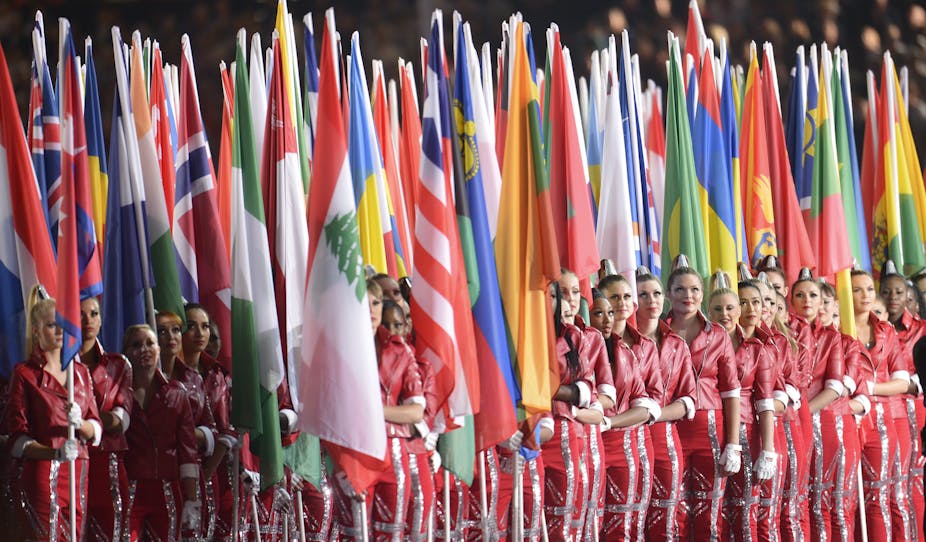As I sat there this morning watching the London 2012 closing ceremony, I was impressed by the artistry, choreography, stage-setting (an artistry unto itself), music and the sense of celebration in the East London stadium.
There were Beatles covers, a reunified Spice Girls, a parade of British supermodels and Eric Idle (of Monty Python fame) singing Always Look on the Bright Side of Life. There was even an appearance by the late-great Queen frontman Freddie Mercury, as he led the crowd through a brief singalong via a projection from his band’s famous 1985 Live Aid performance. Not to mention John Lennon, via a previously unseen (in its entirety) video performance of his classic hit Imagine.
And while the closing ceremony acted as a showcase of British culture and music it was also an exclamation point at the end of a global sporting competition.
A sporting celebration
In the past two weeks, world and Olympic records have been broken, athletes – men, women, young adults, and slightly-less-young adults – have struggled against their bodies, minds and competitors. Some athletes beat personal-bests, others earned medals, and a very fortunate few came away with record-breaking achievements.
Achieving a place at the Olympics as an athlete is an incredible achievement in itself. The focus on medalling, I think, obscures this: of the roughly 7 billion people on Earth, only around 10,000 made it to these Olympic Games – roughly 0.00015% of the world’s population.
Of course, not everyone tried. Those who did were people with access to Olympics qualifications, sports federations, and the freedom to compete.
Each of these more than 10,000 athletes are, individually, truly amazing. Their coaches, families, friends, and social circles are also to be congratulated and not forgotten.

Like millions, if not billions, of other people the world over, I sat in front of the television watching those athletes walking into the Olympic stadium, while listening to the TV commentary. It is this (and other) commentary I’ve had difficulty with throughout the Games.
In Australia, and most probably elsewhere, spectators and athletes alike have heard a lot about “nations” and phrases such as “the people” and “representing your country”.
The trouble is these words are empty. From careful, critical, and robust analyses over the past decades, academics in socio-political philosophy and other fields have shown we don’t exactly know what a “nation” is. Nor do we know who or what “the people” are.
Indeed, as I’ve been working on for the past year, we don’t exactly know what a “country” is either.
Notions of “nationhood”
In reviewing the Olympics, I cannot help but wonder about the nationalistic rhetoric – a rhetoric that, as mentioned, does not make logical sense. It often makes painful sense to the subalterns (those outside the main power structure of a society) in this world: indigenous peoples, those still reeling from the effects of colonialism or experiencing neo-colonialism, the natural environment, and sadly, democratic citizens.
Australia is not a nation, nor does it consist of a people. It is a boundary with many diverse associations and even more diverse individuals that, at times, form aggregates. These aggregates are mistaken for the people.
It is the same error as saying “the people have spoken” when an election or referendum has concluded. During an election, only a portion of “the people” have acted in a way that could be metaphorically taken as having “spoken”. But this action is often poorly informed, or a protest, or uncertain.
Flags of our fathers
As the athletes poured into the stadium, early in the morning from an Australian perspective, flags were waved by each nation’s chosen representative, complementing the fact so many “national” anthems were played during the Games.
It made me wonder: how did these become the flags or anthems of their respective “nations”? Individuals did not get a substantive voice in deciding what the flag of their “nation” would be nor did they decide upon the anthem. These are two examples of illegitimate, undemocratic power being placed very much front-and-centre of a “nations” identity.
Indeed they have been for the duration of these (and any other) Olympic Games.
Is it possible for the Olympics to be more about the athletes and less about mythical political constructs? This could lead to empowering athletes, directing more rewards for their achievements, and breaking through the veil of ersatz power.
Yes, the closing ceremony was a spectacle to behold, but all that glitters is not gold.

